- Home
- Iain Pears
Arcadia
Arcadia Read online
A Note from the Author
* * *
There are many different ways to tell the story of Arcadia and the book you hold in your hands is only one of them.
When I began writing, I also wanted to do something new. I wanted to give you the freedom to put the tale together in your own way.
To take the route through Arcadia which most pleases you, download the Arcadia app for iPhone and iPad from the App Store.
IAIN PEARS
Find out more at: arcadiatheapp.com/enter
To Ruth, as ever.
Contents
Title Page
Dedication
1
2
3
4
5
6
7
8
9
10
11
12
13
14
15
16
17
18
19
20
21
22
23
24
25
26
27
28
29
30
31
32
33
34
35
36
37
38
39
40
41
42
43
44
45
46
47
48
49
50
51
52
53
54
55
56
57
58
59
60
61
62
63
64
65
66
Acknowledgements
About the Author
By the Same Author
Copyright
1
Imagine a landscape. Bathed in sunshine, sweet-smelling from the gentle shower that fell overnight then stopped as dawn broke. A dense grove of holm oak stands at the foot of a hill, damp with the drops of soft-sounding water which leave the ground moist but firm underfoot. In the distance a sliver of water, bright and glittering, reflects the brightness of the sky. The wide river is of a blue so translucent that it is almost indistinguishable from the heavens above. Only the vegetation marks the division between the fields and the range of low-lying hills beyond. It is warm now, but will be hot later on; there is not a cloud to be seen. Down by the river, there are the harvesters with their pitchforks, fanning out across the fields, some already at work.
A young boy looks down on them. They are far away, and he sees that they are talking quietly and seriously, eager to get on with a day’s work. Over his shoulder is an empty leather bag; he is going for the water which the men will soon need when the sun rises higher. The stream is cool from the hills beyond, which mark the end of their world. He does not know what lies outside it. His entire universe is here, the few villages with their rivalries, the seasonal round of crops, animals and festivities.
He is about to leave it for ever.
His name is Jay. He is eleven years old and is an entirely normal boy apart from his tendency to bother people with questions. Why are you doing this? What is that for? What are these? His insatiable curiosity – considered unseemly by his elders and tiresome by those of his own age – means that he has few friends but, on the whole, he is, as his mother continually tells people, no trouble really.
Today the boy’s mind is empty. It is too glorious, and he knows that the warmth on his back and the brilliant sunshine will not last much longer. Already the birds are gathering, preparing for their departure; he does not want to waste a moment in thought. He reaches the stream and kneels down to bathe, feeling the icy cold on his face and his neck, washing away the sweat. Then he bends over and drinks, cupping the water in his hands and slurping it up.
He sits back on his haunches, staring at the water as it reflects the sun in its path, listening to the birds and the gentle sound of the breeze in the trees on the other side of the stream. Then he hears an odd noise, low, even almost melodic. It stops, and Jay shakes his head, then unslings the leather bag to begin filling it.
The noise starts up again, the same tone, like the wind humming through a gap in a window board in winter. It is coming from the other side of a great outcrop of rock which forces the stream to curve in its path down the hill. He gets up, dusts the earth from his bare knees, and wades through the water to where he thinks the sound is coming from.
There is an overhang in the rock, and under it an indentation which forms a small cave. It is dark inside, with the faint, but not unpleasant, smell of rotting vegetation. He peers intently, but sees nothing. It is very perplexing, but no more than that. He is not afraid.
He remembers he has a job to do and is about to go back across the stream to the water bag when he sees a sudden slice of light inside the cave. He starts, and blinks, but he has made no mistake. The light is getting larger. Not bright, just brighter than the surrounding darkness, sufficient only to illuminate the gloom; he can see the ferns, with drops of water hanging off the fronds, the shape of the rocks at the back, the moss and lichen growing over everything.
Then he sees a figure in the light. Hazy, difficult to make out, but definitely a person of some sort. He knows all the stories about the creatures of the woods; the devils and demons, the fairies and the monsters. It is why no one goes there alone, not even in a cold winter when fuel is short. The woods are dangerous to anyone who ventures in unprotected.
Now he realises all the stories were true; his feet and legs are under a mysterious power which stops them obeying his commands to run. He tries to sing – the other way of deterring evil – but no sound comes from his mouth. It is too late.
The figure steps forward and stops. It has seen him. Jay feels he should go down on his knees and beg for mercy, but he can’t do that either. He just stands, mute, trembling and helpless.
He instinctively casts his eyes down to the earth, but still sneaks a glance through his eyelashes. What he sees gives him hope. It is a fairy, that is certain. It has the form of a girl, scarcely bigger than he is, but its face is gentle – although all the world knows that could change in an instant.
He puts his fingertips together and brings them to his lips as he bows, then looks up. The fairy smiles, and he relaxes a little. He got that right, at least. Fairies are sticklers for politeness, and once you have been polite to them and they have accepted the courtesy, they are bound to be peaceable back. So he has heard.
Better still, it then repeats his gesture, and bows back to him! He almost laughs out loud in relief and astonishment, but this unexpected response gesture robs him of any notion of what to do next. So he makes a mistake, stepping out of the rules which the stories have handed down. He speaks.
‘Who are you?’
The creature looks angry, and he regrets his words bitterly.
‘I apologise, my lady,’ he blurts out in the old language, the words of respect he has heard in tales. ‘How may I serve you?’
It smiles once more, a radiant, celestial smile that brings the warmth back to his body. It raises its hands in what he takes to be a gesture of peace – and is gone.
*
Henry Lytten laid down the manuscript he had been reading and peered over his glasses at his audience. He always did that. It was an affected, donnish sort of mannerism, but nobody minded or even noticed. They all had their own affectations and they were long used to his.
‘Bit of Ovid in there,’ one said, screwing up his eyes and examining the
ceiling. ‘Amores 3, if I recall. You’re plagiarising again.’ He never looked directly at people when he spoke.
‘So I am,’ Lytten said. ‘Consider it a subtle allusion to the pastoral tradition.’
‘If I must.’
‘Is that all?’ another asked, beer mug in one hand, pipe in the other, a trail of tobacco ash falling onto the old wooden table as he spoke. ‘It’s a bit short for twenty years’ work.’
‘No,’ Lytten replied. ‘Do you want more?’
‘Where are the dragons? A whole chapter, and not a single dragon?’
Lytten scowled. ‘There are no dragons.’
‘No dragons?’ said the other in mock astonishment. ‘What about wizards?’
‘No.’
‘Trolls?’
‘No. Nothing of the sort.’
‘Thank God for that. Go on.’
It was a very small pub, and shortly after noon on a Saturday. The tiny windows let in little light even at the front; in the room at the back it was almost totally dark, the occasional shaft of illumination from the back door cutting a beam through the thick tobacco smoke which already filled the room. All around were bare walls decorated only with small mirrors, the once-white paint stained yellow by years of smoke. The four men occupied the entire area; occasionally someone else would stick a head through and be met with frowns. The landlord discouraged such interruptions. The group had the back room on a Saturday. They came every week for a few hours of masculine conversation, none of them even thinking of being at home with their wives and families. They were more used to the company of other men, and if asked why they had married in the first place, many of Lytten’s friends and colleagues would have had difficulty coming up with an answer.
Lytten, who had paused so that he could make sure that the others really did want to hear what he had written and weren’t just being polite, sipped his beer, then picked up his pile of paper once more. ‘Very well. You can’t say I didn’t give you a choice. Pay attention now.’
*
Jay was trembling and in tears by the time he got back to the fields; he headed for the women working away from the men, instinctively thinking they would be more understanding. With a surge of relief, he saw his mother, the brown scarf knotted around her head to keep off the sun. He shouted and ran, buried himself into her warm and comforting body, shaking and sobbing uncontrollably.
‘What is it? Jay, what’s happened?’
She examined him quickly, checking for injuries. ‘What is it?’ She bent down level with his face and scrutinised him, holding him by the shoulders. The other women gathered round. ‘Had a fright,’ said an old woman there to supervise the younger ones.
Jay was sure they wouldn’t believe him. Who would? They would think he was just trying to get out of work. His mother would be ashamed of him, would say he was letting the family down.
‘What is it?’ his mother said more urgently.
‘I saw … I saw a … I don’t know. I saw someone. Something. Up there. It just appeared in a cave. Out of nothing. Then vanished again.’
There was a titter of nervous laughter; his mother looked alarmed and annoyed at the same time.
‘What do you mean? Where?’
He pointed back up the hill. ‘Beyond the stream,’ he said.
‘In the woods?’
He nodded. ‘I didn’t mean to go there. But I heard a strange noise.’
‘He’s making it up,’ a woman said: Dell, a gossip who never had a good word to say for anyone. She’d once been beautiful, it was said, but the hardness in her face had long since covered any loveliness. Her scorn was enough to make Jay’s mother straighten up with defiance.
‘We’ll go and look,’ she said. ‘Come on, Jay. I’m sure it was just a trick of the light. You had a fright, but don’t worry.’
Her kindness was reassuring and, ignoring the others who clearly now thought this was some sort of childish joke, Jay’s mother took him by the hand. Only one other woman came as well, the eldest of them, who thought it her duty to be present at every disturbance, however minor. Everyone else got back to work.
Jay retraced his steps to the stream, then over it and into the woods. The old widow bowed and muttered to herself to ward off the spirits until they all stood once more, looking into the cave. There was nothing. No sound, no light, and certainly no fairy.
‘It was just here. It really was,’ he said, looking to see whether they were angry or dismissive. He got no hint, though; their expressions were completely unreadable.
‘What did this fairy look like?’
‘A girl,’ Jay said. ‘She had dark hair. She smiled at me. She was so beautiful.’
‘How was she dressed?’
‘Oh, like nothing you have ever seen! A red robe, shiny and glittering, like it was made of rubies.’
‘You’ve never seen a ruby,’ the old widow said. ‘How would you know?’
‘It shone in the light, dazzlingly bright,’ he insisted. ‘It was wonderful. Then she just disappeared.’
The women looked at each other, then shrugged helplessly. ‘Well, there’s nothing here now,’ his mother said. ‘So I think it would be best to forget about it.’
‘Listen, Jay. This is important,’ said the old widow. She bent down and looked him firmly in the eyes. ‘Not a word. You understand? The sooner this is forgotten the better. You don’t want a reputation for being mad, or a trickster, do you?’
He shook his head.
‘Good. Now, if I hear that you’ve been talking about this, then I’ll give you the biggest beating of your life, and I’m a strong old woman. Now, get your water, and let’s go back to work.’
There was an atmosphere for the rest of the day, an odd division between the men, who knew nothing, worked cheerfully and well, and the women, whose mood was subdued, almost fearful. Jay himself remained shaken; he knew, or rather he hoped, that he had not been dreaming. But he also realised that it was unlikely anyone would ever believe him.
*
Lytten glanced at his companions and smiled briefly. Most were, like him, men in their fifties; all had the care-worn, slightly shabby look of their type. None cared much for elegant clothes, preferring battered tweeds and comfortable, solid shoes. The collars of their shirts were frayed, except for those whose wives turned their shirts before admitting they were beyond repair. The jackets had leather patches sewn onto the elbows to prolong their life; most had socks that had been carefully, and repeatedly, darned. They were, he supposed, his closest friends, people he had known in some cases for decades. Yet he didn’t really think of them as friends, or even as colleagues. He didn’t really know what they were. Just part of his life; the people he spent Saturday with, after some had been in the library and others had worked on the business of teaching for an hour or two.
All of them had a secret passion, which they hid carefully from most of the world. They liked stories. Some had a weakness for detective tales, and had volumes of green-backed Penguins stacked out of sight behind the leather-bound books on Anglo-Saxon history or classical philosophy. Others had an equally fervent and illicit love of science fiction, and adored nothing better than curling up with a tale of interstellar exploration in between lectures on the evolution and reception of the nineteenth-century Russian novel. Others preferred spy stories and adventures, whether Rider Haggard or Buchan or (for the more raffish) James Bond.
Lytten had a weakness for fantastical tales of imaginary lands, peopled (if that was the word) by dragons and trolls and goblins. It was what had drawn him, many years before, into the company of Lewis and Tolkien.
It was an enthusiasm which had taken possession of him when he was thirteen, packed off to bed for four months with measles, then mumps, then chicken pox. So he read. And read, and read. There was nothing else to do; there wasn’t yet even a wireless set to listen to. While his mother kept on bringing him worthy and improving works to read, his father would smuggle in nonsense. Tales of knights and fair maidens, of
gods and goddesses, of quests and adventures. He would read, then lie back and dream, improving the stories where he thought the authors had gone wrong. The dragons would become nastier, the women cleverer, the men less boringly virtuous.
Eventually he had started penning such stories himself, but was always too reticent to show them to anyone. He went to war, then became a scholar, a man of intellectual distinction, and the stories were left unfinished. Besides, it was all very well to criticise the works of others, but in fact it was quite hard, he discovered, to tell a story. His first efforts were not that much better than those he so easily faulted.
Gradually he formed a new ambition, and it was this that he was now, on a quiet Saturday in October 1960, going to reveal in all its as yet unfinished glory to his friends in the pub. He had spent years discussing the efforts of others; now, after much prodding, it was his turn.
He hoped they would be responsive; members had come and gone over the years, and the best had disappeared – Lewis sick in Cambridge, Tolkien in retirement, becoming too famous and too old to write much any more. He missed them; he would have enjoyed watching Lewis’s face.
‘Very well, gentlemen, if you could put your drinks down and pay attention, then I will explain.’
‘About time.’
‘In brief …’
‘Surely not?’
‘In brief, I am creating the world.’
He stopped and looked around. The others seemed unimpressed. ‘No goblins?’ one asked hopefully.
Lytten sniffed. ‘No goblins,’ he said. ‘This is serious. I want to construct a society that works. With beliefs, laws, superstitions, customs. With an economy and politics. An entire sociology of the fantastic.’
‘A story as well, I hope?’
‘Naturally. But stories take place in societies, otherwise they cannot exist. The first must precede the second.’
‘Don’t we have one already? A society, that is.’
‘I want a better one.’
‘Might it not become a bit boring?’ asked Thompson, briefly pulling the pipe out of his mouth to speak. This time he addressed his remarks to the mirror on the far wall. ‘I mean, I suppose you are aiming at the ideal society, but perfection cannot change. How can things happen? If things cannot happen, then you have no story. Anyway, it’s human nature to change, even if for the worse. Otherwise people die of boredom. If you start out perfect, there is nowhere to go but down.’

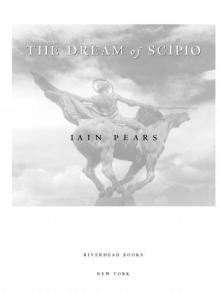 The Dream of Scipio
The Dream of Scipio Stone's Fall
Stone's Fall The Last Judgement
The Last Judgement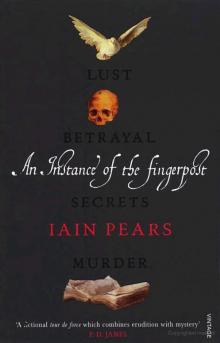 An Instance of the Fingerpost
An Instance of the Fingerpost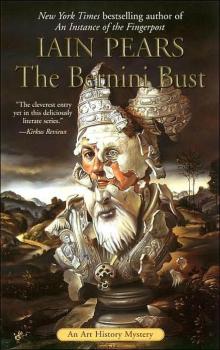 The Bernini Bust
The Bernini Bust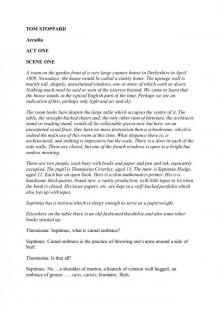 Arcadia
Arcadia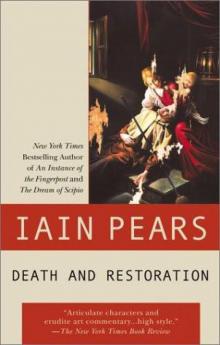 Death and Restoration
Death and Restoration The Raphael Affair
The Raphael Affair The Titian Committee
The Titian Committee The Immaculate Deception
The Immaculate Deception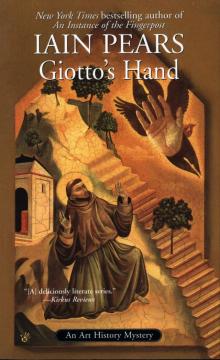 Giotto's hand
Giotto's hand The Portrait
The Portrait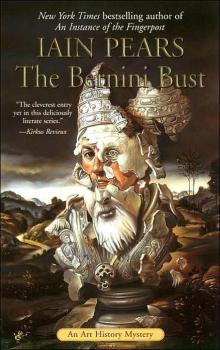 The Bernini Bust ja-3
The Bernini Bust ja-3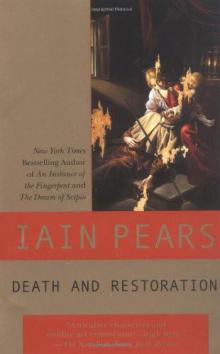 Death & Restoration ja-6
Death & Restoration ja-6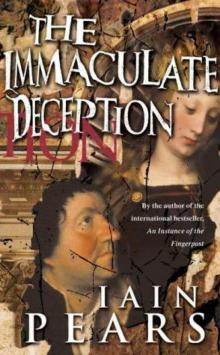 The Immaculate Deception ja-7
The Immaculate Deception ja-7